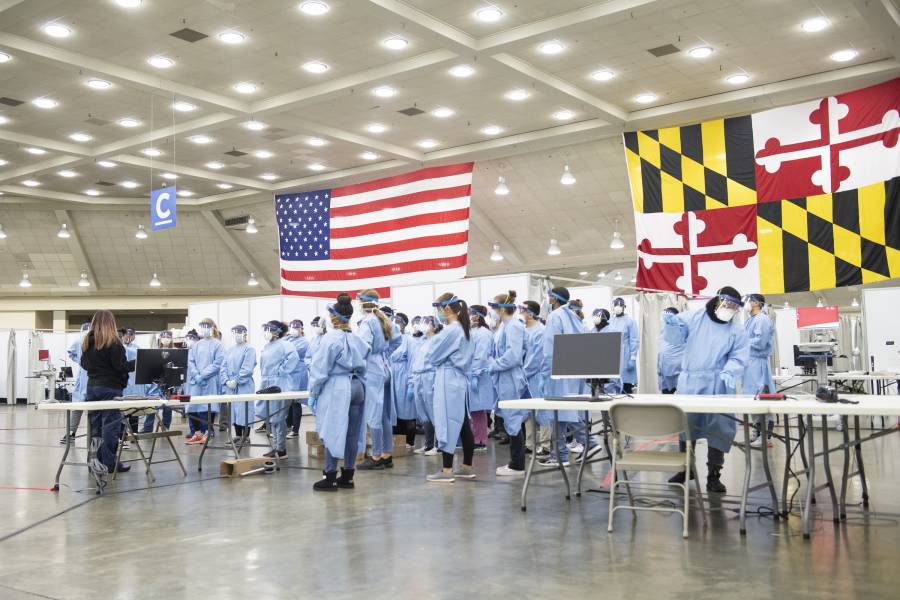Experts from Johns Hopkins Medicine and the University of Maryland Medical System are offering antibody therapies to help prevent patients with mild to moderate COVID-19 symptoms from progressing to more serious illness.
The therapies, including bamlanivimab and Regeneron, are available at no charge to eligible nonhospitalized people who test positive for COVID-19 and have mild or moderate symptoms.
Authorized under emergency use by the Food and Drug Administration last November, the outpatient infusion therapy is available at the state of Maryland's Baltimore Convention Center Field Hospital, jointly operated by Johns Hopkins and the University of Maryland. The site, which as of February 4 had treated more than 1,000 patients, is one of five designated by the state for monoclonal antibody therapy.
Monoclonal antibodies are laboratory-made proteins that mimic the immune system's ability to fight off harmful pathogens such as viruses, the FDA said in its press announcement. Clinical trials of both treatments continue.
"Preliminary findings of clinical trials have shown positive results in treatment of mild to moderate disease in patients considered high risk for progression to severe disease," says David Hirsch, assistant director for nursing and pharmacy services for Johns Hopkins Home Care Group. "Typically, patients progressing to severe disease require a much higher level of care and admission to an acute care facility."
Citing a lack of sufficient data, the National Institutes of Health currently recommends neither for nor against the therapy, while the Infectious Diseases Society of America offers a conditional recommendation, "if, after informed decision-making, the patient puts a high value on the uncertain benefits and a low value on uncertain adverse events."
So far, patients are reporting positive results, says Sophia Purekal, medical director of the Baltimore Convention Center COVID-19 Infusion Center.
"Under study, these medications have exhibited evidence of reducing risk of hospitalization in vulnerable patients," Purekal says. "Anecdotally, most of the patients we have treated have had a positive experience in terms of reduction of symptoms within 48 hours. We believe we also have prevented hospitalization for many patients, and that this has been of help to the hospitalization rate in Maryland."
To qualify for monoclonal therapy, patients must be referred by a physician using the form found at this webpage. An additional referral process for providers may be active in the near future through the Chesapeake Regional Information System for our Patients.
"Launching the Baltimore Convention Center Field Hospital Infusion Center required expertise, commitment and tireless effort from countless teams," says Laura Wortman, director of health care transformation and strategic planning at Johns Hopkins Medicine. "This effort is just the latest example of the ongoing collaboration between Johns Hopkins, the University of Maryland and the state of Maryland."
Patients can usually be seen within two days of referral, Hirsch says. "It's important for providers to keep in mind that the sooner they refer their patients the better the outcome," he says. "Don't wait a couple of days. As soon as you see that the patient tests positive and meets the criteria, they should be referred for treatment."
The three-hour appointment includes one hour for registration and assessment, one hour for the infusion, and a one-hour post-infusion period for education, observation, and discharge. Patients can drive themselves to and from the appointment if they wish. The Baltimore Convention Center Infusion Center offers free transportation to and from the center for patients who are referred for treatment if they need it. (Free transportation can be scheduled by phone at the time the appointment is made.)
Patients who receive monoclonal antibody therapy should consult their primary care physician or specialist before getting a COVID-19 vaccination, says Hirsch, because they will likely need to wait for a specific interval before getting the vaccine. The CDC currently recommends a 90-day waiting period between receiving monoclonal therapy and getting the first or second dose of the COVID-19 vaccine.
Side effects from the infusion therapy, which introduces a liquid medication directly to the bloodstream by injection in a vein on the arm, appear minimal, says Hirsch. Some clinical trial participants reported aches at the injection site, diarrhea, nausea, and vomiting, he said. At the convention center, the most common reported side effect has been fever and chills as a singular event within eight hours of receiving therapy.
"I would tell a patient that, even if they're scared or they're worried, that it's worth it to receive this therapy," says Hirsch. "The side effect profile thus far has been extremely benign. Prevention of potential disease progression from that mild-to-moderate to severe disease process where they could potentially be hospitalized, potentially be intubated, potentially die, is a huge plus."
Posted in Health









